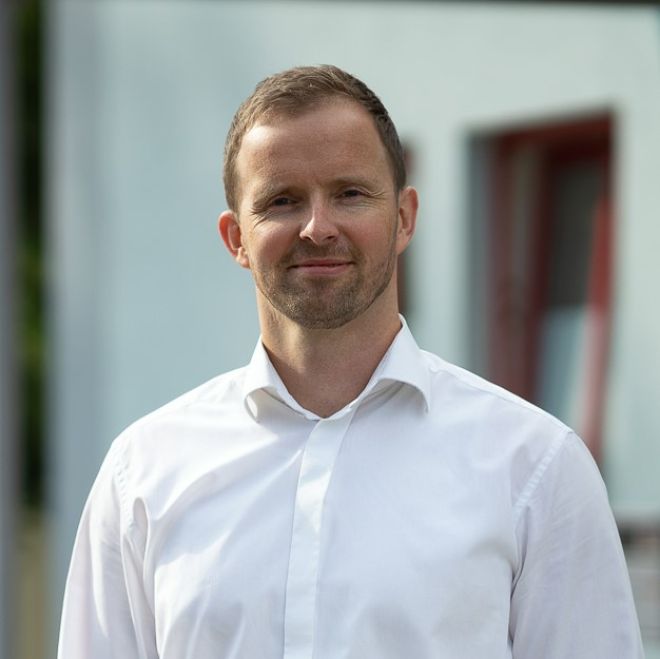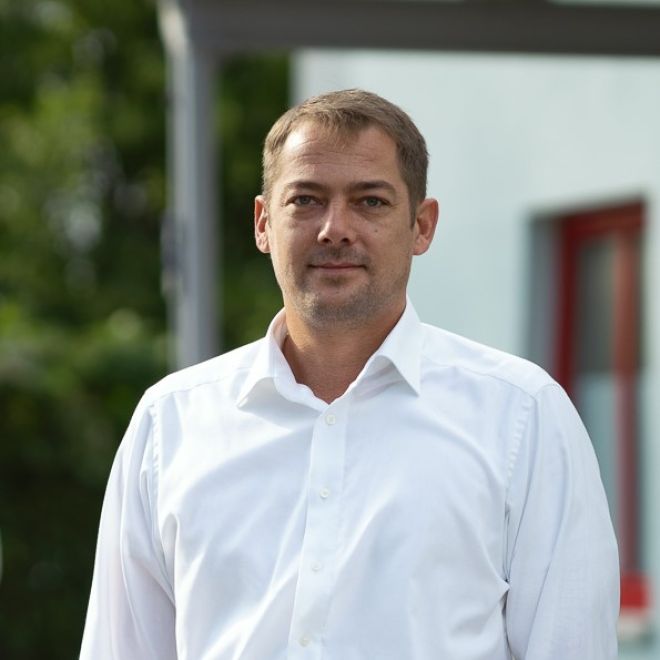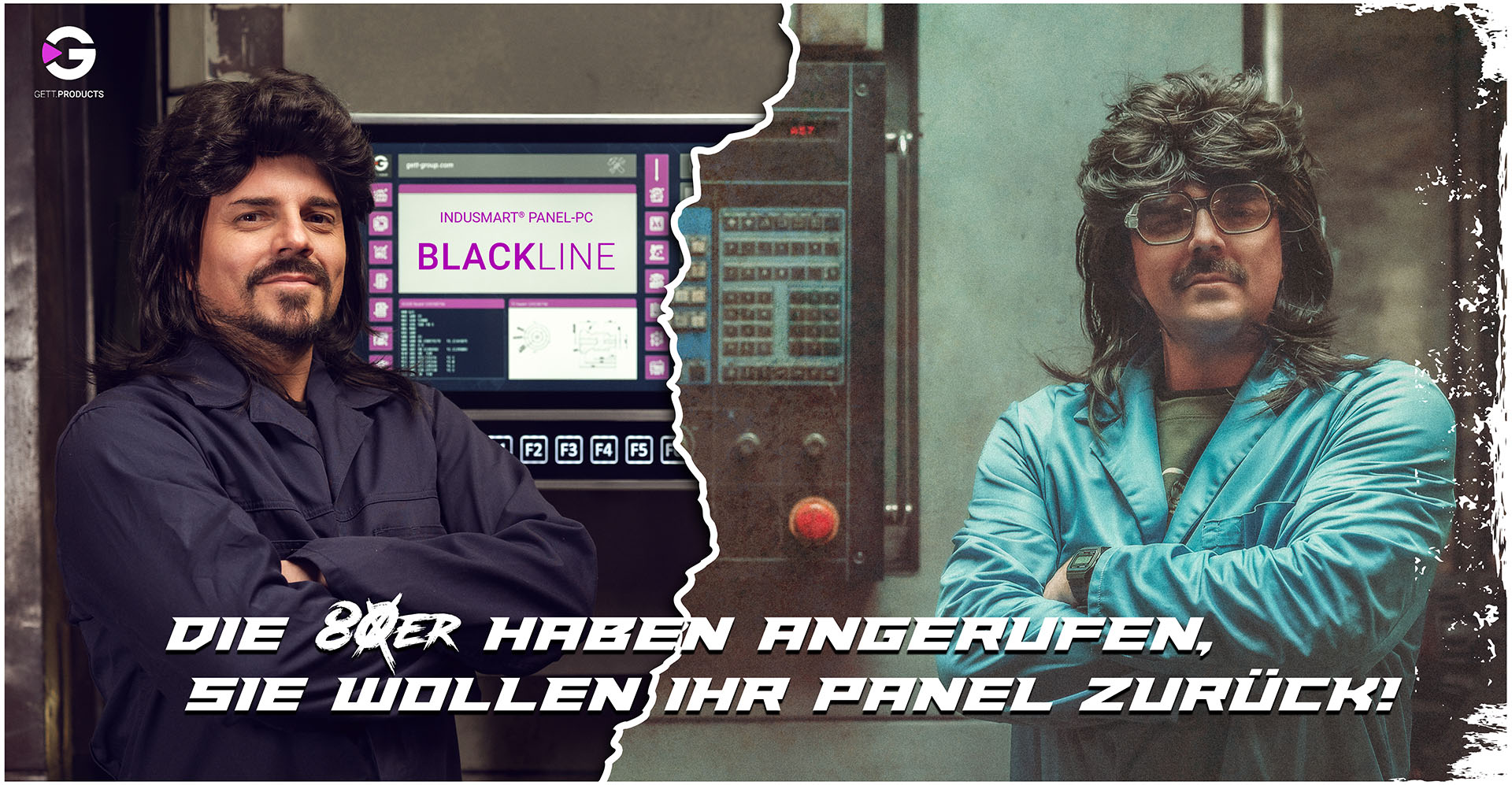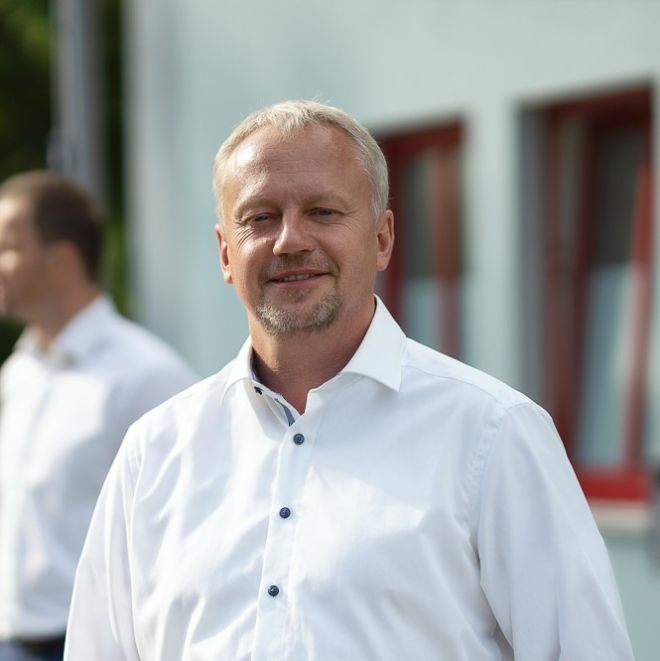
Tino Pietzsch
LIFTING THE LID ON SOME CORPORATE SECRETS
Tell us something about the early days of the GETT corporation?
TP: The GETT Gerätetechnik company was founded in 1996 in Mahnbrück in a garage located in the area where the former managing director, Tobias Möckel, lived. This garage was first used as the base for selling commercial goods in the form of standard keyboards. The first building complex in Treuen wasn’t constructed until one year later.
Why the change from a trading to a manufacturing company?
SM: Alongside requests for standard keyboards, we received many enquiries to modify their design and functions. Tobias Möckel responded to this interest and invested in the relevant printers and milling machines so as to be able to meet the demand. The first special keyboards were also manufactured in the garage at that time.
After 10 successful business years, you then expanded operations to New Jersey in 2007. What motivated you to do this?
TP: We saw that the US market offered a great deal of potential for GETT. We naturally had to combat some obstacles, as the American market operates somewhat differently from the European one. Nevertheless, we didn’t give up and we managed to establish our business on the US market with the help of a distributor based in New Jersey.
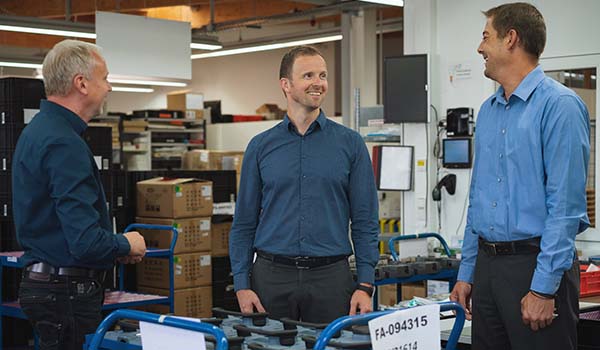
What obstacles has the company had to face during the last few years?
TP: We particularly had to overcome obstacles during the early days. As you might well imagine, it’s very difficult for a new, unknown corporation to tap into a market. We needed to find partners, suppliers and also salespeople who wanted to work with a corporation that was still relatively young. Looking for employees wasn’t straightforward either. Who wanted to work for a company that still had an uncertain future? It was of course impossible for us to avoid the effects of the global economic crisis in 2008. However, after we’d coped with these difficulties, the shareholder soon left the company and this led to a management buyout in 2013. GETT in its current form would probably no longer exist if it hadn’t managed to settle the issue of succession internally. There were some prospective buyers from abroad at that time, but they were mainly interested in gaining access to the German market and their strategy was strongly geared towards achieving synergy effects.
SM: Another challenge, which we face permanently, is the constantly growing demands placed on technology and this is something that our employees in particular have to handle. There’s no training course to become a “keyboard constructor” in that sense, so we make every effort to provide ongoing training for our employees at all times so that they can cope with upcoming evolutionary stages.
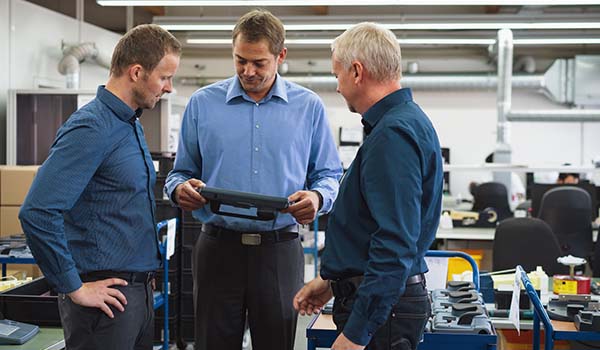
You, Pierre Beer, Tino Pietzsch und Steve Möckel, took over the helm at GETT in 2013. During an interview that coincided with the awarding of the Saxon Milestone Prize, you mentioned a paradigm shift after the management buyout. Why was this necessary and what did it involve?
TP: This was firstly a reaction to the change that was going on at that time from an employer market to an employee market. It was important for us to deal with our employees on an equal footing, to “carry them along with us,” to inspire them and to create a working environment that brought them a sense of pleasure. That’s the only way to be successful in the long term.
SM: Secondly, it naturally involved a generational issue too. We wanted to pass on instructions in more of an eye-to-eye manner, in contrast to the hierarchical practices in the past, so that we could give the employees a greater say in matters.
PB: Given the current dynamics in the markets, it’s simply essential to divide the responsibility on as many shoulders as possible. The employees become more aware of their work and role as a result of this responsibility. That’s turning us into an organization that’s very geared towards teamwork and projects. Employees can make decisions themselves, which is a huge benefit compared to enterprises that are still organized in a very patriarchal way. We want to remain a market leader and that will only succeed if we have a competitive team!
You expanded operations even further one year later when you established a business site in Hong Kong. What opportunities did you see that persuaded you to take this step?
SM: The Asian market is an important element in our products. However, we’re mainly benefitting from its increasing orientation towards technology and dynamism.
TP: The procurement element is a factor that’s just as important. It’s simply impossible to purchase many things that we need to manufacture our products in the European market. Having proximity to our suppliers is naturally very beneficial too.
PB: Alongside procurement, the sales component is also playing an increasingly important role. Some of our largest customers are based in China. The requirements of Chinese customers in terms of quality have increased, which, in turn, generally makes it possible for us to achieve greater sales potential for our products in the Chinese market and in Asia in general. Tapping into this market from Germany would have been hard, simply because of factors like different time zones, the language and the mentality.
2014 was an eventful year for GETT, because you not only expanded to Asia, but took over the global manufacturing rights for the Cleankeys keyboard label. What led to this?
PB: We were just a distributor for Cleankeys in the early stages. When the company’s owner retired, the corporation was put up for sale. Europe was the main sales market for the keyboards and they were an ideal complement to our portfolio; so we didn’t spend a lot of time considering the matter and seized the opportunity. The takeover of the manufacturing and sales rights enabled us to quickly enter the glass input systems segment and we’re now the global market leader in the field of standardized glass keyboards. 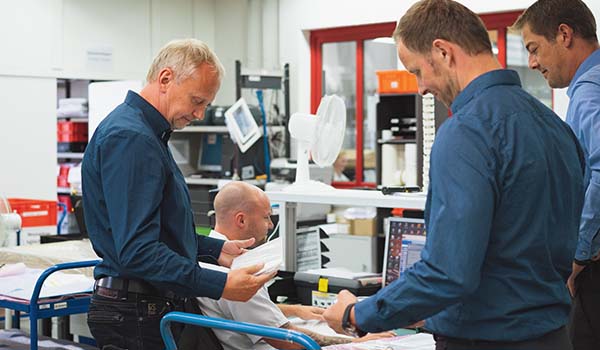
Your annual sales are currently EUR 22.5 million and you employ 200 people around the globe. What do you see when you look to the future?
PB: Hardware, in whatever form, will still be needed. However, the process of technological change will continue at an even faster pace. We remain determined and ready to take risks and will adapt to the coming changes and use them as an opportunity to continue developing the firm.
As Tino Pietzsch has already mentioned, we’re investing in digitalization. This will separate the wheat from the chaff during the next few years. Who will adapt their workflow to rapidly changing markets and who will continue sorting paper files in a cupboard?!
Digitalized and efficient processes, coupled with modern and customer-oriented solutions and services, will increasingly become key competitive factors.
GETT in Portrait
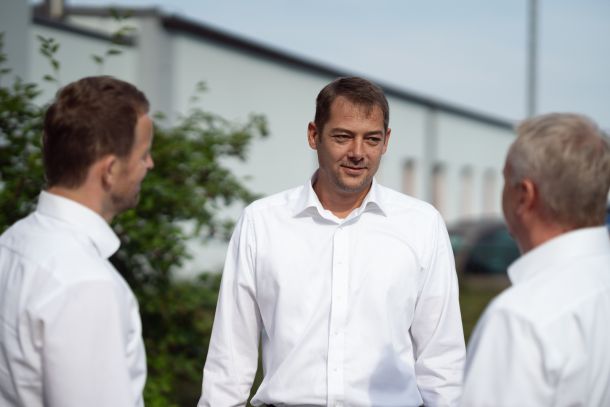
THE MAN OF ACTION
His career at GETT started in 2000. He made his way through many departments at GETT from the quality assurance area to the milling shop and even the support department. He is now a managing director of the company and is responsible for the entire supply chain management.
You’re also on the board of directors at GETT Asia and have excellent insight into the APAC markets. How can we benefit from these markets?
We can first and foremost meet customers’ requirements in terms of technology and price. We also gain from having a stable network of suppliers and sales partners. However, we also benefit from the APAC markets, in turn, because they’ve developed a taste for European products. The requirements related to quality, automation and technology are increasing there too, so that it’s no longer possible to talk about low-budget countries.
How would you advise young people when it comes to choosing a career?
The main thing is to think ahead and focus on what will be required in society. What will people still need in 10 to 15 years from now?
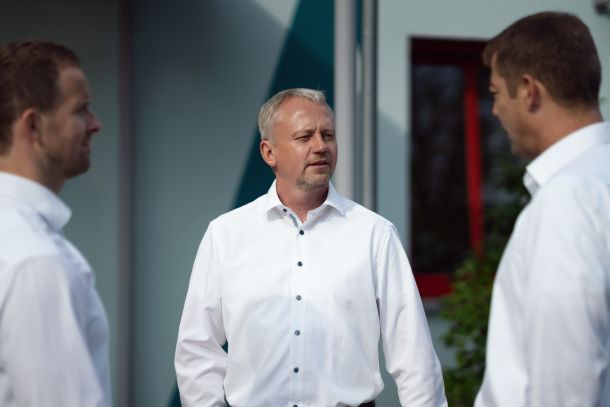
THE OLD HAND AT GETT
The man, who is now a managing director, started his career as a production manager in 1997 and was therefore involved in the early days of the corporation. He is now responsible for the entire processing of orders, including production, warehousing and quality assurance. He has the largest team under his wings – 110 employees.
Tino Pietzsch, among other things, you’re the specialist for the production and assembly departments. How do you view the increasing digitalization and automation in these sectors, particularly with regard to your employees?
The issue isn’t terribly relevant for us in terms of production. 90% of our manufacturing work is performed by hand – so we have a very pronounced level of manual craftsmanship. Apart from the printing and milling departments, value creation will continue to be manual for the foreseeable future too. However, the topic is becoming important with a view to logging and assessing data and the associated optimization of processes. We’ll naturally continue to invest in digitalization in this field. .
How would you advise young people when it comes to choosing a career?
I’d advise young people to study things very carefully, look for a challenge that’s suitable so that they can support a family and make sure that they enjoy what they do.
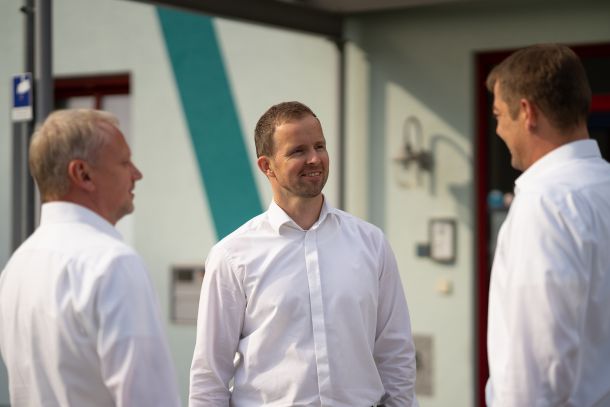
THE VISIONARY
He started his career at GETT as the commercial manager in 2011. However, he already knew the corporation well, as he had looked after it as a banker for five years. He is now a managing director and is responsible for strategy & marketing as well as the finances and controlling department.
Could you have ever imagined being a managing director of a corporation one day and to what extent has this step left its mark on you?
It’s true that I was part of the management team in my position as commercial manager in the past, but I initially had neither the intention nor the expectation of becoming a managing director. This step changed my view of life and caused me to focus on things in a new way. You make important decisions on a daily basis and they, in turn, have consequences for the team at GETT. We employ 200 people, which is to say, 200 families, and we bear a huge responsibility towards them. We take that very seriously.
How would you advise young people when it comes to choosing a career?
Send your application to GETT! (winks)
